Colon and Rectal Polyps
What are Colon and Rectal Polyps?
Colon and rectal polyps are abnormal growths arising from the lining of the large intestine or the rectal canal. Polyps are the most common condition affecting the colon and rectum. They appear in about 15 to 20 percent of adults. Some polyps are flat, while others protrude from the lining of the colon. Polyps of the colon and rectum are usually benign, which means they are not cancerous.
Though colon and rectal polyps are often benign, it’s difficult to predict when one will become cancerous. For this reason, the complete removal of polyps is recommended. If you think you may be suffering from polyps or any other condition affecting your digestive health, don’t hesitate to visit Dr. Berookim for an evaluation.

Symptoms of Colon and Rectal Polyps
There are often no early warning signs from rectal or colon polyps. However,when symptoms are present, they may include:
- Mucous discharge
- Blood in stool
- Fatigue caused by loss of blood over time
- Diarrhea (rare)
- Abdominal pain (rare)
Because symptoms of polyps are rare, it is important to undergo regular evaluation with a skilled gastroenterologist like Dr. Berookim.
Diagnosing Rectal and Colon Polyps
To diagnose your polyps, Dr. Berookim may perform a colonoscopy or other imaging test to determine whether you are at risk. A large polyp may be felt during a rectal exam, but a colonoscopy inspects the entire colon and is therefore the most effective method of detecting polyps.
Before your colonoscopy, Dr. Berookim will sit down with you to discuss your medical history. He will also explain the bowel preparation needed to ensure your colonoscopy is a success.
You will be under conscious sedation during your colonoscopy to ensure you remain comfortable and relaxed. The procedure lasts just 30 minutes and provides valuable information about your colorectal health. If tests reveal you are suffering from colon or rectal polyps, Dr. Berookim will talk with you to determine the best steps for managing your condition.
Treatment for Colon or Rectal Polyps
Because there is no way of predicting when or if a polyp will become malignant, total removal of all polyps is recommended. Polyps can be removed in a few different ways.
During a colonoscopy, polyp removal can be performed with minimal discomfort. Small polyps may be removed using a forceps biopsy, while large polyps are typically removed with a wire. Large polyps sometimes may require more than one treatment for complete removal. If polyps are too large or positioned in a way that makes them tricky to remove using the doctor’s instruments, surgery maybe required.
Depending on the severity of your particular case, Dr. Berookim will determine the best treatment to protect your long-term health.
Will Colon or Rectal Polyps Recur?
Once polyps have been removed, it is very uncommon for them to reappear. However, the same factors that caused the initial polyp may cause the formation of a new polyp. New polyps will develop in at least 30 percent of people who have previously had polyps. Eating a low-fat diet that is high in fruits, vegetables, and fiber will help you maintain colon and rectal health. See Dr. Berookim for regularly scheduled followup visits to check for new polyps.
Contact the Gastroenterology Institute of Southern California
Dr. Berookim strives to help all patients detect and eliminate colon or rectal polyps before they can become cancerous. He offers compassionate care using the most advanced techniques available. If you would like to learn more about rectal or colon polyps, or if you’re suffering from a GI-related issue, please don’t hesitate to call 310.271.1122 to schedule an appointment.

